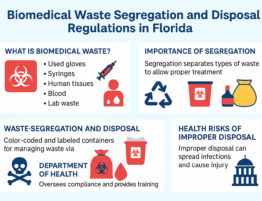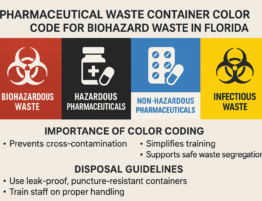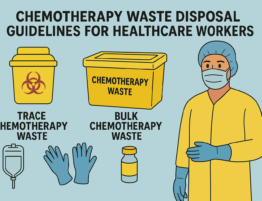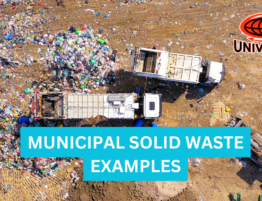
Importance of Waste Management in Hospital
10 Importance of Proper Health Care Waste Disposal
- Protection of Public Health: Proper disposal of healthcare waste minimizes the risk of infection and the spread of disease. Sharp objects, contaminated materials, and biological waste, if not managed correctly, can lead to serious health hazards for both healthcare workers and the public.
- Environmental Safety: Improper waste disposal can lead to environmental contamination, affecting soil, water, and air quality. Proper disposal practices reduce pollution and promote a healthier ecosystem.
- Compliance with Legal Standards: Adhering to waste management regulations ensures that hospitals comply with national and international laws, avoiding legal repercussions and fines.
- Prevention of Cross-Contamination: Effective waste management prevents cross-contamination between infectious and non-infectious waste, reducing the risk of hospital-acquired infections.
- Enhanced Workplace Safety: Proper waste disposal practices create a safer working environment for hospital staff, reducing the incidence of needlestick injuries and exposure to hazardous materials.
- Cost Efficiency: Efficient waste management can lead to cost savings by reducing the need for extensive cleaning, lowering waste processing costs, and preventing fines associated with non-compliance.
- Reputation Management: Hospitals that prioritize waste management are seen as more responsible and trustworthy, enhancing their reputation among patients and the broader community.
- Resource Conservation: Proper segregation and disposal allow for the recycling and safe disposal of materials, contributing to resource conservation efforts.
- Minimization of Antimicrobial Resistance: Effective management of pharmaceutical waste helps prevent the development of antimicrobial resistance, a growing global health threat.
- Supporting Sustainable Development Goals (SDGs): By managing waste responsibly, hospitals contribute to the achievement of several SDGs, including good health and well-being, clean water and sanitation, and responsible consumption and production.
Hospital Waste Management Guidelines
Hospitals must follow stringent guidelines to manage waste effectively. Key elements of these guidelines include:
- Segregation: Waste should be segregated at the point of generation into different categories, such as general waste, infectious waste, sharps, and chemical waste.
- Collection and Storage: Each waste category should be collected in appropriate, labeled containers and stored in designated areas until disposal.
- Transportation: Waste should be transported in a manner that prevents spillage and exposure, using dedicated vehicles or routes.
- Treatment and Disposal: Different types of waste require different treatment methods, such as incineration, autoclaving, or chemical disinfection. Final disposal should be in compliance with local regulations.
Importance of Waste Management in Hospitals
Healthcare waste management is crucial for maintaining a safe and healthy environment in hospitals. Proper management:
- Reduces Health Risks: It mitigates the risk of infections and injuries, particularly from sharps and infectious waste.
- Protects the Environment: Prevents environmental degradation by ensuring that hazardous substances do not enter the ecosystem.
- Promotes Public Confidence: Demonstrates a hospital’s commitment to high standards of hygiene and safety, fostering trust among patients and the community.
Key Steps in Health Care Waste Management
- Waste Audit: Conducting an audit to understand the types and quantities of waste generated helps in planning effective waste management strategies.
- Policy Development: Developing a clear waste management policy ensures that all staff understand their roles and responsibilities.
- Training and Education: Regular training sessions for staff ensure that they are aware of best practices and safety protocols.
- Monitoring and Evaluation: Continuous monitoring and evaluation help identify areas for improvement and ensure compliance with guidelines.
- Stakeholder Engagement: Engaging with all stakeholders, including waste management companies and regulatory bodies, ensures a coordinated approach to waste management.
Importance of Hospital Waste Management
Hospital waste management is a critical component of healthcare operations. It ensures:
- Patient and Staff Safety: Proper handling of waste reduces the risk of exposure to infectious and hazardous materials.
- Regulatory Compliance: Compliance with waste management regulations is essential to avoid penalties and maintain operational licenses.
- Operational Efficiency: A well-organized waste management system improves the efficiency of hospital operations, allowing healthcare providers to focus on patient care.
Frequently Asked Questions (FAQs) Importance of Waste Management in Hospitals
1. What are the types of hospital waste?
Hospital waste can be categorized into general waste, infectious waste, hazardous waste, radioactive waste, and recyclable waste.
2. Why is segregation important in hospital waste management?
Segregation ensures that different types of waste are treated appropriately, reducing health risks and environmental impact.
3. How do hospitals dispose of infectious waste?
Infectious waste is typically treated through autoclaving, incineration, or chemical disinfection to neutralize pathogens before disposal.
4. What role does staff training play in effective waste management?
Staff training ensures everyone understands how to handle and dispose of waste safely, reducing the risk of accidents and non-compliance.
5. What are the consequences of poor waste management in hospitals?
Poor waste management can lead to health hazards, environmental pollution, legal penalties, and a tarnished reputation for healthcare facilities.
Final Thoughts








